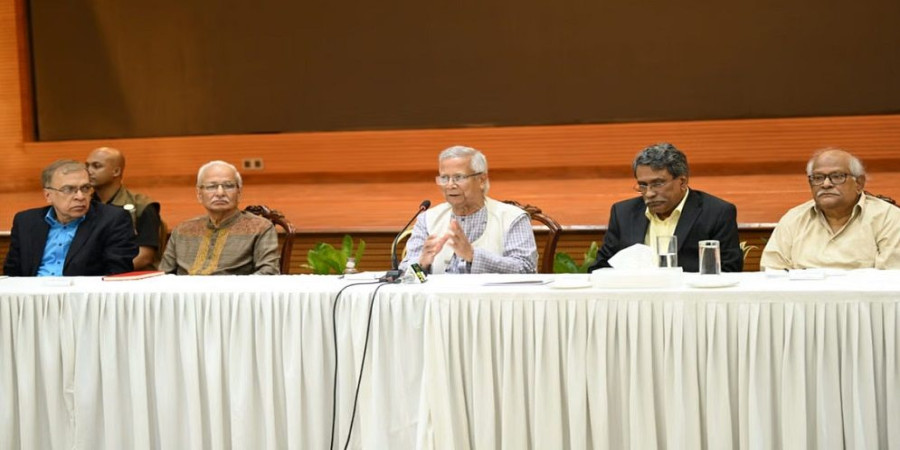
ছবি: Photo: Collected
Dr. Muhammad Yunus emphasizes unity and collaborative progress in second phase of National Consensus Commission dialogue
Chief Adviser Dr. Muhammad Yunus stated that the primary goal of the second phase of the National Consensus Commission's meetings is to bridge existing gaps and incorporate additional points into the upcoming July Charter. He made the remarks on Monday afternoon while presiding over a session with various political parties at the Foreign Service Academy in Dhaka.
Welcoming the participating political representatives, Dr. Yunus expressed his appreciation for the opportunity to engage in dialogue. He noted that despite his numerous meetings throughout the day, he finds the greatest satisfaction in sitting with political leaders to discuss the future of the nation. According to him, these discussions are vital to shaping the real future of Bangladesh, and he feels honored to be part of this process.
Dr. Yunus recalled that the commission was entrusted with the responsibility of implementing reforms, although in the beginning, there was some uncertainty about where to begin. Through a series of initial discussions, it was decided to form several commissions to address the necessary reforms in a structured and in-depth manner. Initially, six commissions were established, with an additional six formed later. These commissions were given 90 days to complete their work.
He noted with satisfaction that most of the commissions completed their tasks within the given timeframe, while a few required more time, which he considered acceptable. Once the reports were submitted, the next step was to move toward building a broad-based consensus. This gave rise to the idea of establishing a separate National Consensus Commission.
The chief adviser praised the performance and contributions of the commission under the leadership of Professor Ali Riaz. He expressed personal joy at the collaboration and active participation of the political parties involved, acknowledging that he was initially unsure whether there would be genuine interest from all sides. However, he was pleasantly surprised by the depth of engagement shown by all participants. He noted that not only did the parties interact meaningfully with the commissions, but they also held internal deliberations and approached the discussions sincerely, even challenging the commissions' views when necessary.
Reflecting on the progress made, Dr. Yunus explained that the first phase of the process has concluded, during which agreements were reached on various recommendations. The ultimate goal, he stated, is to compile these points of consensus into the July Charter, which will serve as a formal declaration of national unity on key issues.
Looking ahead to the second phase, he mentioned discussions with Professor Ali Riaz on the opportunity to reach consensus on several remaining issues that are close to being resolved. He stressed the importance of not missing this chance to enrich the list of recommendations to be included in the July Charter.
Dr. Yunus reiterated that the aim of this phase is to close the remaining gaps and ensure that the charter reflects an even broader consensus. He emphasized the significance of producing a national document that incorporates collective agreement on critical matters.
He concluded by highlighting the broader significance of the effort, stating that as a nation, Bangladesh should take pride in not fostering divisive politics but rather promoting unity for the country's development and well-being. He expressed hope that this inclusive effort will result in a remarkable and representative July Charter, laying the foundation for sustained national progress.
repoter






